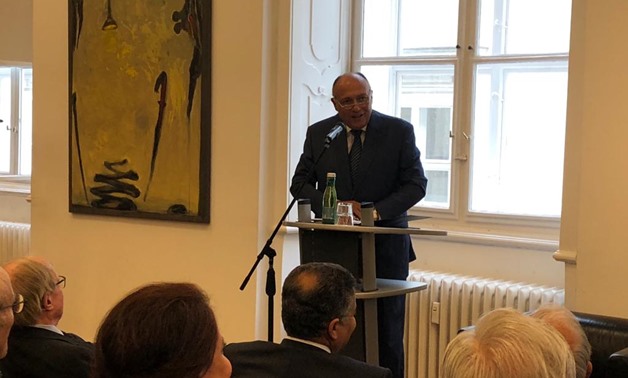
Shoukry was delivering a speech on Monday during a lecture titled "Foreign Policy of Egypt" at the Foreign Policy and United Nations Association of Austria (UNA-Austria)- press photo
CAIRO - 1 July 2020: Foreign Minister Sameh Shoukry said the United Nations Security Council will take its time to discuss the complaint submitted to it by Egypt on the Grand Ethiopian Renaissance Dam (GERD) project.
He clarified that there is a proper understanding of the Ethiopian side's point of view, and there are great Egyptian attempts to facilitate benefiting from this huge project to achieve development.
The foreign minister's speech came during a phone call to Ahl Misr program, where he stressed that the intransigence of the other side would lead to an increase in the intensity of the negotiations.
He added that flexibility does not mean giving up the interests of the state, but rather properly evaluating the situation, and facilitating negotiations for the interest of the three countries.
The minister said that Egypt and Sudan, as the two downstream countries, are keen on their continuous coordination and solidarity without forming a bloc against Ethiopia, to facilitate the negotiations undertaken by to resolve this crisis.
Shoukry pointed out that the foundations of the Egyptian foreign policy depend on mutual benefit and contribution to achieving development.
Egypt respects and appreciates the historical relationship with Ethiopia, stressing that Egypt has always been cooperating with neighboring countries, and hoping that this policy will be followed by our brothers in Ethiopia.
Since 2014, Egypt, Ethiopia, and Sudan have entered into negotiations on the building of the dam to avoid any possible threats on the Nile downstream countries [Egypt and Sudan]. The latest round of talks, which convened early June, reached a stalemate, and was followedby the Ethiopian unilateral act of deciding to fill the dam’s reservoir mid-July without reaching a final agreement with Egypt and Sudan.
Egypt previously decided to request the United Nations Security Council’s intervention in the dispute on Ethiopia’s massive dam, after Egypt had said several times that the two countries have reached a deadlock.
The conflict between Egypt, Sudan, and Ethiopia dates back to May 2011 when Ethiopia started building the dam; Egypt voiced concern over its water share [55.5 billion cubic meters]. Three years later, a series of tripartite talks between the two countries along with Sudan began to reach an agreement, while Ethiopia continued the dam construction.
In 2015, the three countries signed the Declaration of Principles, per which the downstream countries should not be negatively affected by the construction of the dam. In October 2019, Egypt blamed Addis Ababa for hindering a final agreement concerning a technical problem, calling for activating Article No. 10 of the Declaration of Principles, which stipulates that if the three countries could not find a solution to these disputes, they have to ask for mediation.


Comments
Leave a Comment